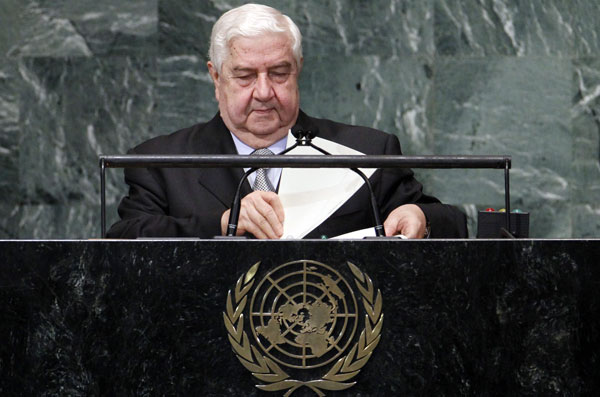Syrian FM accuses U.S. of promoting ‘terrorism’

By Sara Rajabova
At the UN General Assembly session, the Syrian Foreign Minister Walid al-Moallem has accused the U.S. and its allies of promoting "terrorism" and blaming everyone from neighbors and extremists to the media for escalating the war - except the Syrian government, Associated Press reported.
Addressing ministers and diplomats from the United Nation's 193 member states as fighting spread in the historic Old City of Aleppo, Foreign Minister Moallem lashed out at calls in Washington and in Arab and European capitals for Syrian President Bashar Assad to step down as interference in Syria's domestic affairs.
Moualem told the UN General Assembly on Monday that his country has been facing "organised terrorism" for over a year, a reference to the countries that are backing the armed opposition in its fight against the government.
He mentioned countries such as Turkey, Saudi Arabia, Qatar and Libya, which Syria accuses of supplying arms and funding, and training and sheltering "terrorist groups."
"We also wonder to what extent the statements of Qatar, Saudi Arabia, Turkey, the United States, and France that clearly induce and support terrorism in Syria with money, weapons and foreign fighters, are in line with the international responsibilities of these countries in combating terrorism", Moualem said.
"This terrorism which is externally supported is accompanied by unprecedented media provocation based on igniting religious extremism sponsored by well-known states in the region," he said.
Members of the opposition said it was common knowledge that these neighboring Arab countries were supporting and financing the rebels, but said the Assad government had brought it upon itself after cracking down on protests that began peacefully 18 months ago.
Moallem's speech followed his meeting with Secretary-General Ban Ki-moon in which the U.N. chief "raised in the strongest terms the continued killings, massive destruction, human rights abuses, and aerial and artillery attacks committed by the government," according to a statement by his press office. "He stressed that it was the Syrian people who were being killed every day, and appealed to the Government of Syria to show compassion to its own people."
The Syrian foreign minister in his address invited the opposition to "work together to stop the shedding of Syrian blood" and said that a Syrian-led dialogue could produce a "more pluralistic and democratic" country.
The opposition called the speech a classic case of regime "propaganda," and dismissed his calls for dialogue as not genuine.
"While the brutal and delusional Syrian regime continues to pay lip service to diplomacy, its actions over the past 18 months have demonstrated beyond any doubt that they have no interest in meaningful reform or dialogue" Radwan Ziadeh, a U.S.-based spokesman for the chief opposition group, the Syrian National Council, said in a statement.
On many other points, the Syrian opposition's political factions and the rebel groups fighting on the ground are deeply divided.
Mokhtar Lamani, the Damascus representative of the new U.N.-Arab League peace envoy to Syria, said Monday that the large number of rival rebel and opposition groups is one of the main obstacles to Lakhdar Brahimi's goal, which is to broker an end to the Syrian crisis.
Brahimi, who visited Damascus last month, will pay a second visit to Syria soon and will tour the country, Lamani said. Asked whether he still sees hope of a political solution in Syria despite the bloodshed, Lamani said that's why he's in Damascus - "because I hope that in the end there would be some light."
The US and France have called for regime change in Syria while Qatar, Saudi Arabia and Turkey are widely believed to be arming rebels fighting President Assad's regime, Al Jazeera reported.
Qatar's emir Sheikh Hamad bin Khalifa al-Thani told the assembly last week that Arab countries should intervene in Syria out of "national, humanitarian, political and military duties" in the face of the UN Security Council's failure to act.
Moualem said that peace requires action not only by Syria but by Turkey, Saudi Arabia, Qatar, Libya and others to stop arming and financing the opposition.
Moualem called for political solution and Syrian-led dialogue to agree on roadmap to a more democratic country.
Fighting in the country has left up to 30,000 people dead, according to estimates by activists.
The Security Council's major powers are deeply divided over the 18-month Syria conflict. Russia and China, key backers of Assad, have vetoed three resolutions by the U.S., Great Britain and France, who back the opposition and want the threat of sanctions to pressure the government to agree to a political transition.
